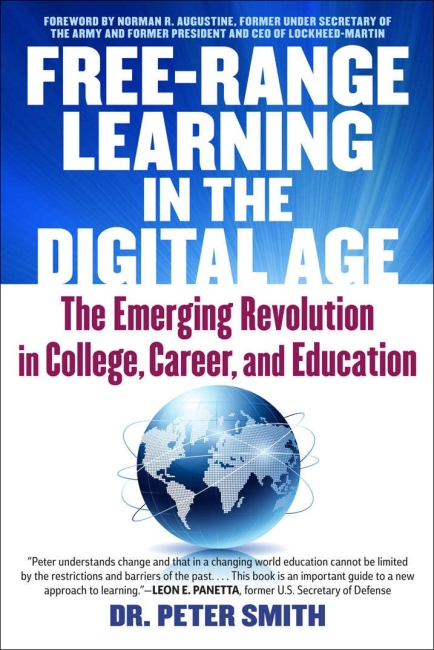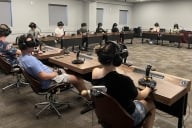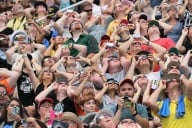You have /5 articles left.
Sign up for a free account or log in.

Select Books
There’s a “silent learning revolution” underway in higher education, Peter Smith writes in Free-Range Learning in the Digital Age (Select Books).
Millions of adults are held back in their careers because they lack a college degree. But an “explosion” of new educational resources is enabling more and more adult learners to break through this barrier, Smith says.
By historically failing to recognize the “hidden credentials” in each of us, a majority of colleges and employers have created a world where “what you know is valued based on where you learned it, not how well you know it and can apply it.”
“This is knowledge discrimination, pure and simple,” writes Smith. But the tide is changing. In his book, Smith interviews adult learners who have changed their lives by seeking “free-range” learning opportunities.
By examining a spectrum of new technologies and opportunities, and talking to the innovators, CEOs and college presidents behind them, Smith hopes his book will provide the tools for all to “blaze their own learning trail.”
In the book, Smith walks readers through how to assess their own learning achievements and tells the stories of several real people who pursued education opportunities outside of a college campus. He highlights features that make colleges adult friendly and describes various noncollege options available to adult learners -- offering a "taste of things to come, as well as a sampling of what is already out there waiting for you."
A Street-Level View of Adult Learning
Smith said he started thinking about writing Free-Range Learning in the Digital Age about a year and a half ago. “It was right when the connection between college graduation and work readiness was starting to bubble up,” he says. “I really wanted to get at that connection between learning and work and explore it.”
But Smith said he didn’t want to write an “arm's-length policy book”; rather, he wanted to talk to “real people on the street.” Smith’s interviewees come from a variety of backgrounds; some tried going to college but didn’t finish, while others felt that college was never a possibility for them.
“What I got was a really human look at the consequences of not getting an education -- and the incredible power and joy that comes from being able to get one on terms that are friendly to your life circumstance,” said Smith. “That wasn’t possible 10 or 15 years ago.”
A common thread linking these learners is that they reached personal or professional crossroads that prompted them to try to change their lives, said Smith. For Irving Gomez, it was being passed up for a promotion at work because he didn’t have an M.A. For Kelley Lawrence, it was hearing that her young son wanted to be a marine biologist but thought that he couldn’t become one because neither of his parents went to college.
Asked why he included these perspectives in the book, Smith said that policy makers often write education policy “without really thinking about who it affects.” He added, “I wanted them to understand that human element … The intelligence that is there.”
At the beginning of the book, Smith spends time talking about how almost all of us underestimate the personal learning we undertake. “The median adult spends about 15 hours every week on highly specific learning projects. And colleges account for only a small portion of that,” he wrote.
“People’s astonishment at finding out what they already knew helped me to understand that good assessment of learning is a pedagogy in its own right,” said Smith.
Adult-Friendly Colleges Featured in the Book
Charter Oak State College
Community College of Vermont
University of Maryland University College
Rio Salado College
Southern New Hampshire University
A Desert Turned Green
Free-Range Learning in the Digital Age is a progression from Smith’s last book, Harnessing America’s Wasted Talent: A New Ecology of Learning (Jossey-Bass), which he wrote eight years ago.
“At that time we were just on the verge of developing new technologies that would allow us to achieve things with people that were unachievable before,” he said. “I was trying to suggest where things were going; it was more speculative.”
Free-Range Learning is a reflection on nearly 50 years of thinking on how to assess experiential learning, said Smith. Many ideas that were once philosophical are now reality.
“That information-poor desert has gone green,” he said. “We have the technology now to harvest all our learning and assign it a value.”
There are already many models for delivering lifelong learning, whether certificates, degrees or valuable personal experiences, said Smith. But by speaking to the innovators and educators pioneering these models, he learned that providing quality programs is a common concern. The book features interviews with leaders of companies such as StraighterLine, Civitas Learning and General Assembly, as well as nonprofits like edX, the Open Education Consortium and Saylor Academy.
The question of how best to assign value to learning is one that will become increasingly important, said Smith. As the need to better support learners comes into focus, he predicts that traditional faculty roles will evolve to focus more on student advising. The primary place of learning in our society will shift from the college campus to the workplace, predicted Smith.
Smith warned that colleges that don’t adapt to support adult learners could lose out.
“There are already dozens of adult-friendly colleges and traditional colleges amending their policies and practices to be friendlier to adults,” he said.
That said, Smith still believes that those who can go to college at 18 should do so. But they should not view graduating as the end of their education.
“The days where you hold the same job and live in the same town for 50 years are over.”
Smith hopes that people will use his book as a tool to reflect on their own learning and potential, as well as that of those around them.
Our society “has an enormous amount of capacity that is being ignored,” he said.
More than a missed opportunity, Smith, who was once a U.S. congressman, views this potential waste as a national security issue.
“If we can’t tap into the national talent of this country, then we will be left behind,” he said. “We need to get everyone up to that table of opportunity.”








